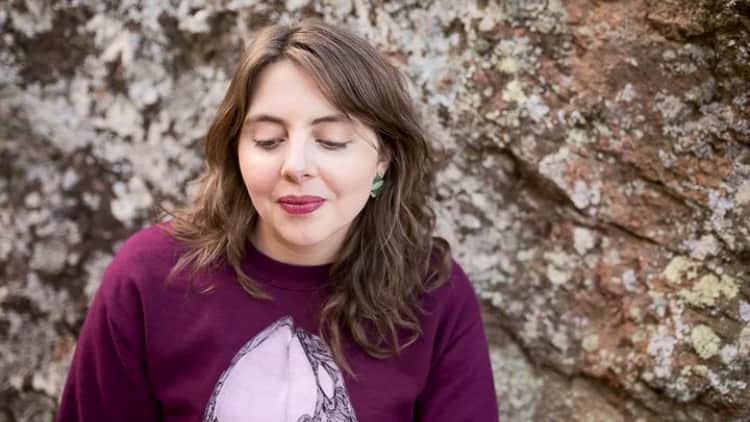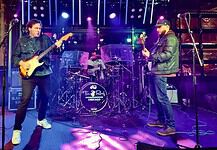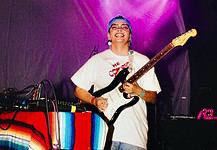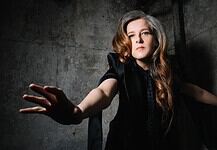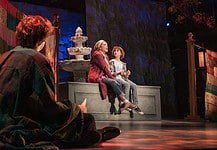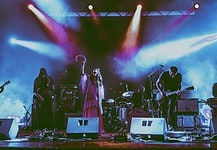Last Updated on November 30, 2022, 11:01 AM | Published: November 30, 2022
I thought about trying to write a full review of Moriah Bailey’s new album “i tried words” without falling back on the easiest grand descriptors like “cinematic,” “movie-like,” or “picturesque.”
Describing music with visual terminology is usually just a tired and too-easy way of saying that it’s moody, evocative, or lushly produced, anything that could easily be used as dramatic score or soundtrack to a movie scene. And while “i tried words” is all of those things, and while any song on the album would make for a guaranteed scene-stealing soundtrack standout, I worried that relying on those terms to describe the beauty of Bailey’s songs would betray their originality and complexity compared to more standard orchestral folk.
Then I realized that struggling with the limitations of words is kind of the whole point.
Bailey essentially broadcasts to you right up front with the album’s title that this is the sound of her banging her head against the inability of words to ever accurately describe a sensory experience or define an emotion or feeling. She tells you before the album even begins that she knows words aren’t enough, but she gave it a shot anyway. Because sometimes words are all we have, and sometimes, even if they’re ignored or ineffective or ultimately pointless, our words are how we shrink an idea until it fits into our head.
So it’s in that same spirit that I’ll try to describe or define “i tried words” to the best of my words’ abilities, even if that means a lot of visual clichés and tired adjectives. Because sometimes that’s all you have.
And also because “cinematic” might honestly be the perfect way to describe Bailey’s work.
With her trademark affected harp and the help of a beautifully loose and comfortably improvisational band, Bailey and company create their own environment that’s organic and constantly shifting. Even while maintaining consistent melodies or progressions, the instruments blend together and morph into one another. The instrument that your ear catches at the beginning of a melody might not be the one you hear finish it.
It’s difficult to not use visual descriptions for this music because it’s difficult to not visualize the world they’re creating with it.
It might not be right to call this “conceptual” music, but (and here I go tripping over words and definitions again) there’s definitely something impressionistic happening inside many of these songs.

“The Downpour” builds its persistent rhythm into windswept cymbal rolls and a pitter-pattering marimba that all so effortlessly recall the sounds of a rainstorm. “A Late Spring” is announced by the kind of wind chime and piano opening that puts you in mind of romance and fairy tales before so gradually transitioning into a somber folk song that you hardly notice it happening, just as Bailey sings of her own sad, slow disenchantment.
The players are constantly handing off the melodic focus to one another with an ease and a relaxed naturalness that you very rarely hear outside of jazz, which is all the more impressive when you learn that they all recorded their parts separately, in some cases states away.
And yet, if you aren’t paying attention to that interplay and ambience and environmental development, you’ll miss it, because the focal point always remains on Bailey’s breathy, endlessly emotive voice – part Bjork, part Kate Bush, part Dolores O’Riordan – and more than anything, on her words.
Bailey has already made it clear that the collection of stories she’s telling here – or indeed the one unfolding story she’s telling throughout – is inspired by the dichotomies and conflicts of language and words, and the delicate, dangerous balancing act of a woman finding and using her voice.
“My Father’s Words” is a short, concise statement culminating with “snakes are more scared of you than you are of them,” a declaration of knowing your size and understanding your power.
“My Mother’s Words” is longer, more nuanced, more challenging. She sings “you can’t say yes if you can’t say no,” a declaration of understanding when you have no power.
Both are equally loaded with unspoken implication. Both implications are equally chilling.
When she drops the album’s title into “A Late Spring,” it’s as a final, exhausted understanding of how easily words can fail to make sense of a person’s motivations or feelings or thoughts. It’s a clear summation, even early in the album, that words can’t do it alone.

So yes, the music on “i tried words” is gorgeous and vivid (more visual words,) but rather than scoring a film, it’s all used to score Bailey’s lyrical storytelling, and it adds an appropriate drama and grand theater to the tiny, internal conflicts of language and meaning that she’s exploring.
There can come a point when even just raising your voice to ask for what you want or need is heroic, when finding the right words is as difficult as defeating an enemy, and when understanding what’s in someone else’s head might as well be fantasy.
Those moments can feel like you’re outside your body watching yourself on a screen, and so they deserve a soundtrack as grand and dramatic as fine cinema.
Moriah Bailey has created that soundtrack with “i tried words.”
It’s a work of both immense, orchestral beauty and soft, hushed intimacy. It’s a wide-screen hero shot flooded with natural light just as much as it’s an internal monologue or a silent realization.
It’s safe to say that it really can’t be put into words.
“i tried words” by Moriah Bailey hits streaming services and digital retailers Friday, December 2nd via Keeled Scales Records.
Brett Fieldcamp has been covering arts, entertainment, news, housing, and culture in Oklahoma for nearly 15 years, writing for several local and state publications. He’s also a musician and songwriter and holds a certification as Specialist of Spirits from The Society of Wine Educators.
